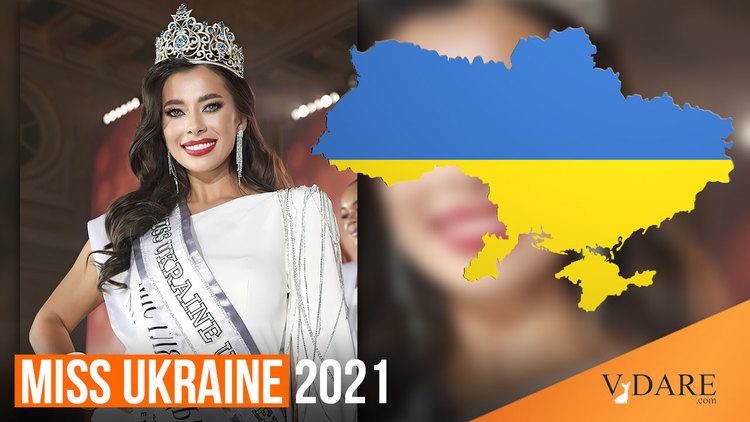
01/28/2022
See also: Demography Is Destiny — In Crimea And In The U.S.
If it were possible to choose ethnic affiliation before being born, I think it would be wise to avoid being born into a small nation located right up against a big, proud empire: Tibet or Turkestan, Armenia in Ottoman days or Serbia when Austria was great. Nationalities like that are liable to have histories much unhappier than the average.
That’s the context in which I think of Ukraine.
For many years, I have had friends among the White Russians here in and around New York; White, I mean, as opposed to Red.
These were descendants of Russians who'd fled from the Bolshevik revolution of 1917. There’s a big settlement of them in Sea Cliff, ten miles from us here on Long Island’s North Shore. We used to attend the Petroushka Ball, a big annual event for White Russians in New York City. You would have been able to attend this year’s Petroushka on February 11th, but they're in process of rescheduling it due to Covid.
Among these children and grandchildren of Tsarist Russia, there was a vein of sentiment — by no means universal, but common enough to notice — that Ukraine was really just part of the Motherland, of Russia.
People of this kidney laughed at the idea of Ukraine as an independent nation. Sure, these people would say, there are separatists in the west of Ukraine, and it was certainly terrible what Stalin did to Ukraine in the 1930s; but they're Russian just like us.
"We used to call the place ‘Little Russia,’" they'd tell me, which is true. The Ukrainian language? Eh, just a dialect of Russian. Whether that’s true…ask a linguist.
There is a rough parallel between Ukraine’s relation to Russia and Ireland’s to Britain. Ukraine is a sort of Ireland.
Religion is something of a factor, too, although I don’t know enough to say how much of one. In Ireland it was Catholics versus Protestants, in Ukraine Catholic versus Orthodox.
As someone said: History doesn’t repeat itself, but it rhymes.
All right, the parallel is a rough one, and I've probably ticked off Ukrainian listeners. I’m only passing on what I heard across dinner tables at the Petroushka Ball. My friendships with White Russians have lapsed, and I don’t have a dog in this fight.
Neither does the U.S., for all I can see. Ukraine’s status is a European issue. The European Union has three times the population of Russia and ten times the nominal GDP. They even have nukes; at any rate the French do.
If the Europeans can’t organize a common defense against Russian aggression, that sure is a shame. But I don’t see why the U.S. has to ride to the rescue.
There is simply no reason for us to be in NATO. Donald Trump said so when he was campaigning in 2016, and he was right. He didn’t follow through of course, he just let himself be buffaloed by the generals and the bureaucrats in the departments of state and defense; but he was right none the less.
If American voters have the great good sense to elect a capable, effective National Conservative president in 2024, getting us the hell out of NATO should be near the top of his to-do list.
That’s assuming NATO still exists in 2024. Given the current clearing of throats and shuffling of feet among European governments about what, if anything, should be done about Ukraine, the continued existence of NATO with or without us is by no means certain [Will America have to go it alone? Biden is worried NATO won’t let him deploy troops to protect Ukraine because member countries fear Putin will punish them, Daily Mail, January 28, 2022].
Here’s another Ukraine-Ireland parallel. After they got independence a hundred years ago this coming December, the Irish didn’t do much with it. I mean they didn’t put forth any great efforts to make themselves a prosperous modern nation.
Through most of the twentieth century, up to the rise of the Celtic Tiger around 1990, independent Ireland vegetated in poverty, introversion, and backwardness. The lifestyle ideal, according to one historian of the country, was, quote, "to sit around a peat fire discussing the Council of Trent in Gaelic."
A lot of Irish people found that unsatisfactory, so that Ireland’s principal export was…people.
Ukraine is the same, though with qualifications. Since independence in 1991 Ukraine has not, either politically or economically, been a model any country would want to emulate.
To be fair, it’s true that much of the trouble has been Russia stirring the pot, plus the usual cack-handed attempts by our own State Department missionaries to manipulate things the other way. Ireland was stagnant and corrupt from the twenties to the eighties, but nobody’s claimed it was Britain’s fault…well, nobody outside Ireland.
Still, the results in Ukraine have been dire. Exporting people? Oh yeah:
Ukrainians vote with their feet. Nine million have work abroad, according to the National Security and Defense Council of the [sic] Ukraine, and 3.2 million have full-time jobs in other countries. There are only 21 million Ukrainians between the ages of 20 and 55, which suggests that more than two-fifths of prime working-age Ukrainians earn their living elsewhere.
I took that from an article by David Goldman at Asia Times, January 26th: Ukraine is the hollow man of Europe: Why fight over a country whose birthrate is 1.23 children per female and with one of the world’s highest out-migration rates?
Goldman’s article is a great heaping dish of negativity, all supported by published statistics. Yes, fertility really has collapsed. By the end of this century Ukraine’s population will have fallen by half, according to the U.N. Population Program. Say what you like about the twentieth-century Irish, but they kept reproducing.
And the Ukrainians most likely to emigrate are the best-educated. Remittances from overseas workers already comprise eleven percent of Ukraine’s GDP.
The Ukraine National Academy of Science’s Institute for Demography reckons that the true population is only 35 million, not the 48 million given in the official census. The Institute also predicts that three out of 10 Ukrainian men now aged 20 will die before the age of 60 due to alcoholism and auto accidents.
Please don’t think I’m grinning and chuckling here at the misfortunes of Ukrainians. I’m an ethnonationalist. In my ideal world every distinct people with a fair historical claim to some one territory would be ruling itself in that territory as a nation, trading freely and fairly with other nations. Ukraine, Ireland, Tibet, Biafra, …hey.
We are a long way from that ideal, though, and there are some knotty unresolved problems. What happens when two distinct peoples claim the same territory? Are the inhabitants of Taiwan a "distinct people"? The Catalans? Palestinian Arabs? Turkish Cypriots?
There’s a lot of history yet to be worked through before the reign of universal peace and justice arrives.
Until then we have to manage our own affairs as best we can, and meddle in other people’s only when we are quite sure we know what we are doing, and why.
Which is to say, on the evidence of the past thirty years of U.S. foreign policy, hardly ever.

John Derbyshire writes an incredible amount on all sorts of subjects for all kinds of outlets. (This no longer includes National Review, whose editors had some kind of tantrum and fired him.) He is the author of We Are Doomed: Reclaiming Conservative Pessimism and several other books. He has had two books published by VDARE.com com: FROM THE DISSIDENT RIGHT (also available in Kindle) and FROM THE DISSIDENT RIGHT II: ESSAYS 2013.
For years he’s been podcasting at Radio Derb, now available at VDARE.com for no charge. His writings are archived at JohnDerbyshire.com.
Readers who wish to donate (tax deductible) funds specifically earmarked for John Derbyshire’s writings at VDARE.com can do so here.
This is a content archive of VDARE.com, which Letitia James forced off of the Internet using lawfare.